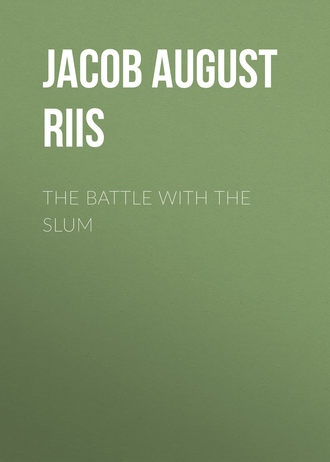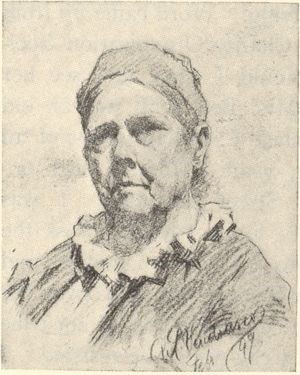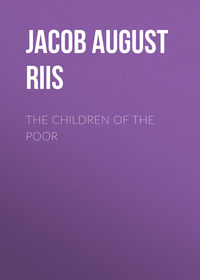 полная версия
полная версияThe Battle with the Slum
That is what it comes down to in the end: common sense and common honesty. Common sense to steer us clear of the "sociology" reef that would make our cause ridiculous, on Fifth Avenue and in East Broadway. I have no quarrel with the man who would do things by system and in order; but the man who would reduce men and women and children to mere items in his infallible system and classify and sub-classify them until they are as dried up as his theories, that man I will fight till I die. One throb of a human heart is worth a whole book of his stuff. Common honesty to keep us afloat at all. If we worship as success mere money-getting, closing our eyes to the means, let us at least say it like the man who told me to-day that "after all, one has to admire Bill Devery; he's got the dough," Devery was Tammany's police chief. The man is entitled to his opinion, but if it gets hitched to the reform cart by mistake, the load is going to be spilled. It has been, more than once.
A saving sense of humor might have avoided some of those pitfalls. I am seriously of the opinion that a professional humorist ought to be attached to every reform movement, to keep it from making itself ridiculous by either too great solemnity or too much conceit. As it is, the enemy sometimes employs him with effect. Failing the adoption of that plan, I would recommend a decree of banishment against photographers, press-clippings men, and the rest of the congratulatory staff. Why should the fact that a citizen has done a citizen's duty deserve to be celebrated in print and picture, as if something extraordinary had happened? The smoke of battle had not cleared away after the victory of reform in the fall of 1894, before the citizens' committee and all the little sub-committees rushed pell-mell to the photographer's to get themselves on record as the men who did it. The spectacle might have inspired in the humorist the advice to get two sets made, while they were about it, one to serve by and by as an exhibit of the men who didn't; and, as the event proved, he would have been right.
But it is easy to find fault, and on that tack we get no farther. Those men did a great work, and they did it well. They built from the bottom and they built the foundation broad and strong. Good schools, better homes, and a chance for the boy are good bricks to build with in such a structure as we are rearing. They last. Just now we are laying another course; more than one, I hope. But even if it were different, we need not despair. Let the enemy come back once more, it will not be to stay. It may be that, like Moses and his followers, we of the present day shall see the promised land only from afar and with the eye of faith, because of our sins; that to a younger and sturdier to-morrow it shall be given to blaze the path of civic righteousness that was our dream. I like to think that it is so, and that that is the meaning of the coming of men like Roosevelt and Waring at this time with their simple appeal to the reason of honest men. Unless I greatly err in reading the signs of the times, it is indeed so, and the day of the boss and of the slum is drawing to an end. Our faith has felt the new impulse; rather, I should say, it has given it. The social movements, and that which we call politics, are but a reflection of what the people honestly believe, a chart of their aims and aspirations. Charity in our day no longer means alms, but justice. The social settlements are substituting vital touch for the machine charity that reaped a crop of hate and beggary. Charity organization—"conscience born of love" some one has well called it—is substituting its methods in high and low places for the senseless old ways. Its champions are oftener found standing with organized labor for legislation to correct the people's wrongs, and when the two stand together nothing can resist them. Through its teaching we are learning that our responsibility as citizens for a law does not cease with its enactment, but rather begins there. We are growing, in other words, to the stature of real citizenship. We are emerging from the kind of barbarism that dragged children to the jail and thrust them in among hardened criminals there, and that sat by helpless and saw the foundlings die in the infant hospital at the rate—really there was no rate; they practically all died, every one that was not immediately removed to a home and a mother. For four years now a joint committee of the State Charities' Aid Association and the Association for Improving the Condition of the Poor has taken them off the city's hands and adopted them out, and in every hundred now eighty-nine live and grow up! After all, not even a Jersey cow can take the place of a mother with a baby. And we are building a children's court that shall put an end to the other outrage, for boys taken there are let off on probation, to give them the chance under a different teaching from the slum's, which it denied them till now.

Flag-drill in the "King's Garden." The Playground at the Jacob A. Riis House.
We have learned that we cannot pass off checks for human sympathy in settlement of our brotherhood arrears. The Church, which once stood by indifferent, or uncomprehending, is hastening to enter the life of the people. I have told of how, in the memory of men yet living, one church, moving up-town away from the crowd, left its old Mulberry Street home to be converted into tenements that justly earned the name of "dens of death" in the Health Department's records, while another became the foulest lodging house in an unclean city, and of how it was a church corporation that owned the worst underground dive down-town in those bad old days, and turned a deaf ear to all remonstrances. The Church was "angling for souls." But souls in this world live in bodies endowed with reason. The results of that kind of fishing were empty pews and cold hearts, and the conscience-stricken cry that went up, "What shall we do to lay hold of this great multitude that has slipped from us?"
The years have passed and brought the answer. To-day we see churches of every denomination uniting in a systematic canvass of the city to get at the facts of the people's life of which they had ceased to be a part, pleading for parks, playgrounds, kindergartens, libraries, clubs, and better homes. There is a new and hearty sound to the word "brother" that is full of hope. The cry has been answered. The gap in the social body, between rich and poor, is no longer widening. We are certainly coming closer together. A dozen years ago, when the King's Daughters lighted a Christmas tree in Gotham Court, the children ran screaming from Santa Claus as from a "bogey man." Here lately the boys in the Hebrew Institute's schools nearly broke the bank laying in supplies to do him honor. I do not mean that the Jews are deserting to join the Christian Church. They are doing that which is better,—they are embracing its spirit; and they and we are the better for it.
"The more I know of the Other Half," writes a friend to me, "the more I feel the great gulf that is fixed between us, and the more profoundly I grieve that this is the best that Christian civilization has as yet been able to do toward a true social system." Let my friend take heart. She herself has been busy in my sight all these years binding up the wounds. If that be the most a Christian civilization has been able to do for the neighbor till now, who shall say that it is not also the greatest? "This do and thou shalt live," said the Lord of him who showed mercy. That was the mark of the brotherhood. No, the gulf is not widening. It is only that we have taken soundings and know it, and in the doing of it we have come to know one another. The rest we may confidently leave with Him who knows it all.
God knows we waited long enough; and how close we were to one another all the while without knowing it! Two or three years ago at Christmas a clergyman, who lives out of town and has a houseful of children, asked me if I could not find for them a poor family in the city with children of about the same ages, whom they might visit and befriend. He worked every day in the office of a foreign mission in Fifth Avenue, and knew little of the life that moved about him in the city. I picked out a Hungarian widow in an East Side tenement, whose brave struggle to keep her little flock together had enlisted my sympathy and strong admiration. She was a cleaner in an office building; not until all the arrangements had been made did it occur to me to ask where. Then it turned out that she was scrubbing floors in the missionary society's house, right at my friend's door. They had passed one another every day, each in need of the other, and each as far from the other as if oceans separated them instead of a doorstep four inches wide.
Looking back over the years that lie behind with their work, and forward to those that are coming, I see only cause for hope. As I write these last lines in a far-distant land, in the city of my birth, the children are playing under my window, and calling to one another with glad cries in my sweet mother-tongue, even as we did in the long ago. Life and the world are before them, bright with the promise of morning. So to me seem the skies at home. Not lightly do I say it, for I have known the toil of rough-hewing it on the pioneer line that turns men's hair gray; but I have seen also the reward of the toil. New York is the youngest of the world's great cities, barely yet out of knickerbockers. It may be that our century will yet see it as the greatest of them all. The task that is set it, the problem it has to solve and which it may not shirk, is the problem of civilization, of human progress, of a people's fitness for self-government, that is on trial among us. We shall solve it by the world-old formula of human sympathy, of humane touch. Somewhere in these pages I have told of the woman in Chicago who accounted herself the happiest woman alive because she had at last obtained a playground for her poor neighbors' children. "I have lived here for years," she said to me, "and struggled with principalities and powers, and have made up my mind that the most and the best I can do is to live right here with my people and smile with them,—keep smiling; weep when I must, but smile as long as I possibly can." And the tears shone in her gentle old eyes as she said it. When we have learned to smile and weep with the poor, we shall have mastered our problem. Then the slum will have lost its grip and the boss his job.
Until then, while they are in possession, our business is to hold taut and take in slack right along, never letting go for a moment.
And now, having shown you the dark side of the city, which, after all, I love, with its great memories, its high courage, and its bright skies, as I love the little Danish town where my cradle stood, let me, before I close this account of the struggle with evil, show you also its good heart by telling you "the unnecessary story of Mrs. Ben Wah and her parrot." Perchance it may help you to grasp better the meaning of the Battle with the Slum. It is for such as she and for such as "Jim," whose story I told before, that we are fighting.
CHAPTER XVII
THE UNNECESSARY STORY OF MRS. BEN WAH AND HER PARROT
Mrs. Ben Wah was dying. Word came up from the district office of the Charity Organization Society to tell me of it. Would I come and see her before I went away? Mrs. Ben Wah was an old charge of mine, the French Canadian widow of an Iroquois Indian, whom, years before, I had unearthed in a Hudson Street tenement. I was just then making ready for a voyage across the ocean to the old home to see my own mother, and the thought of the aged woman who laid away her children long ago by the cold camp-fires of her tribe in Canadian forests was a call not to be resisted. I went at once.
The signs of illness were there in a notice tacked up on the wall, warning everybody to keep away when her attic should be still, until her friends could come from the charity office. It was a notion she had, Mrs. McCutcheon, the district visitor, explained, that would not let her rest till her "paper" was made out. For her, born in the wilderness, death had no such terror as prying eyes.
"Them police fellows," she said, with the least touch of resentment in her gentle voice, "they might take my things and sell them to buy cigars to smoke." I suspect it was the cigar that grated harshly. It was ever to her a vulgar slur on her beloved pipe. In truth, the mere idea of Mrs. Ben Wah smoking a cigar rouses in me impatient resentment. Without her pipe she was not herself. I see her yet, stuffing it with approving forefinger, on the Christmas day when I had found her with tobacco pouch empty, and pocket to boot, and nodding the quaint comment from her corner, "It's no disgrace to be poor, but it's sometimes very inconvenient."

Mrs. Ben Wah.
There was something in the little attic room that spoke of the coming change louder than the warning paper. A half-finished mat, with its bundle of rags put carefully aside; the thirsty potato-vine on the fire-escape, which reached appealingly from its soap-box toward the window, as if in wondering search for the hands that had tended it so faithfully,—bore silent testimony that Mrs. Ben Wah's work-day was over at last. It had been a long day—how long no one may ever know. "The winter of the big snow," or "the year when deer was scarce" on the Gatineau, is not as good a guide to time-reckoning in the towns as in the woods, and Mrs. Ben Wah knew no other. Her thoughts dwelt among the memories of the past as she sat slowly nodding her turbaned head, idle for once. The very head-dress, arranged and smoothed with unusual care, was "notice," proceeding from a primitive human impulse. Before the great mystery she "was ashamed and covered her head."
The charity visitor told me what I had half guessed. Beyond the fact that she was tired and had made up her mind to die, nothing ailed Mrs. Ben Wah. But at her age, the doctor had said, it was enough; she would have her way. In faith, she was failing day by day. All that could be done was to make her last days as easy as might be. I talked to her of my travels, of the great salt water upon which I should journey many days; but her thoughts were in the lonely woods, and she did not understand. I told her of beautiful France, the language of which she spoke with a singularly sweet accent, and asked her if there was not something I might bring back to her to make her happy. As I talked on, a reminiscent smile came into her eyes and lingered there. It was evidently something that pleased her. By slow degrees we dragged the bashful confession out of her that there was yet one wish she had in this life.
Once upon a time, long, long ago, when, as a young woman, she had gone about peddling beads, she had seen a bird, such a splendid bird, big and green and beautiful, with a red turban, and that could talk. Talk! As she recalled the glorious apparition, she became quite her old self again, and reached for her neglected pipe with trembling hands. If she could ever see that bird again—but she guessed it was long since gone. She was a young woman then, and now she was old, so old. She settled back in her chair, and let the half-lighted pipe go out.
"Poor old soul!" said Mrs. McCutcheon, patting the wrinkled hand in her lap. Her lips framed the word "parrot" across the room to me, and I nodded back. When we went out together it was settled between us that Mrs. Ben Wah was to be doctored according to her own prescription, if it broke the rules of every school of medicine.
I went straight back to the office and wrote in my newspaper that Mrs. Ben Wah was sick and needed a parrot, a green one with a red tuft, and that she must have it right away. I told of her lonely life, and of how, on a Christmas Eve, years ago, I had first met her at the door of the Charity Organization Society, laboring up the stairs with a big bundle done up in blue cheese-cloth, which she left in the office with the message that it was for those who were poorer than she. They were opening it when I came in. It contained a lot of little garments of blanket stuff, as they used to make them for the pappooses among her people in the far North. It was the very next day that I found her in her attic, penniless and without even the comfort of her pipe. Like the widow of old, she had cast her mite into the treasury, even all she had.
All this I told in my paper, and how she whose whole life had been kindness to others was now in need—in need of a companion to share her lonely life, of something with a voice, which would not come in and go away again, and leave her. And I begged that any one who had a green parrot with a red tuft would send it in at once.
New York is a good town to live in. It has a heart. It no sooner knew that Mrs. Ben Wah wanted a parrot than it hustled about to supply one at once. The morning mail brought stacks of letters, with offers of money to buy a parrot. They came from lawyers, business men, and bank presidents, men who pore over dry ledgers and drive sharp bargains on 'Change, and are never supposed to give a thought to lonely widows pining away in poor attics. While they were being sorted, a poor little tramp song-bird flew in through the open window of the Charities Building in great haste, apparently in search of Mrs. McCutcheon's room. Its feathers were ruffled and its bangs awry, as if it had not had time to make its morning toilet, it had come in such haste to see if it would do. Though it could not talk, it might at least sing to the sick old woman—sing of the silent forests with the silver lakes deep in their bosom, where the young bucks trailed the moose and the panther, and where she listened at the lodge door for their coming; and the song might bring back the smile to her wan lips. But though it was nearly green and had tousled top, it was not a parrot, and it would not do. The young women who write in the big books in the office caught it and put it in a cage to sing to them instead. In the midst of the commotion came the parrot itself, big and green, in a "stunning" cage. It was an amiable bird, despite its splendid get-up, and cocked its crimson head one side to have it scratched through the bars, and held up one claw, as if to shake hands.
How to get it to Mrs. Ben Wah's without the shock killing her was the problem that next presented itself. Mrs. McCutcheon solved it by doing the cage up carefully in newspaper and taking it along herself. All the way down the bird passed muffled comments on the Metropolitan Railway service and on its captivity, to the considerable embarrassment of its keeper; but they reached the Beach Street tenement and Mrs. Ben Wah's attic at last. There Mrs. McCutcheon stowed it carefully away in a corner, while she busied herself about her aged friend.
She was working slowly down through an address which she had designed to break the thing gently and by degrees, when the parrot, extending a feeler on its own hook, said "K-r-r-a-a!" behind its paper screen.
Mrs. Ben Wah sat up straight and looked fixedly at the corner. Seeing the big bundle there, she went over and peered into it. She caught a quick breath and stared, wide-eyed.
"Where you get that bird?" she demanded of Mrs. McCutcheon, faintly.
"Oh, that is Mr. Riis's bird," said that lady, sparring for time; "a friend gave it to him—"
"Where you take him?" Mrs. Ben Wah gasped, her hand pressed against her feeble old heart.
Her friend saw, and gave right up.
"I am not going to take it anywhere," she said. "I brought it for you. This is to be its home, and you are to be its mother, grandma, and its friend. You are to be always together from now on—always, and have a good time." With that she tore the paper from the cage.
The parrot, after all, made the speech of the occasion. He considered the garret; the potato-field on the fire-escape, through which the sunlight came in, making a cheerful streak on the floor; Mrs. Ben Wah and her turban; and his late carrier: then he climbed upon his stick, turned a somersault, and said, "Here we are," or words to that effect. Thereupon he held his head over to be scratched by Mrs. Ben Wah in token of a compact of friendship then and there made.
Joy, after all, does not kill. Mrs. Ben Wah wept long and silently, big, happy tears of gratitude. Then she wiped them away, and went about her household cares as of old. The prescription had worked. The next day the "notice" vanished from the wall of the room, where there were now two voices for one.
I came back from Europe to find my old friend with a lighter step and a lighter heart than in many a day. The parrot had learned to speak Canadian French to the extent of demanding his crackers and water in the lingo of the habitant. Whether he will yet stretch his linguistic acquirements to the learning of Iroquois I shall not say. It is at least possible. The two are inseparable. The last time I went to see them, no one answered my knock on the door-jamb. I raised the curtain that serves for a door, and looked in. Mrs. Ben Wah was asleep upon the bed. Perched upon her shoulder was the parrot, no longer constrained by the bars of a cage, with his head tucked snugly in her neck, asleep too. So I left them, and so I like to remember them always, comrades true.
It happened that when I was in Chicago last spring I told their story to a friend, a woman. "Oh, write it!" she said. "You must!" And when I asked why, she replied, with feminine logic: "Because it is so unnecessary. The barrel of flour doesn't stick out all over it."
Now I have done as she bade me. Perhaps she was right. Women know these things best. Like my own city, they have hearts, and will understand the unnecessary story of Mrs. Ben Wah and her parrot.
1
The draft riots of 1863.
2
"The experiment has been long tried on a large scale, with a dreadful success, affording the demonstration that if, from early infancy, you allow human beings to live like brutes, you can degrade them down to their level, leaving them scarcely more intellect, and no feelings and affections proper to human hearts."—Report on the Health of British Towns.
3
Satire III, Juvenal.
4
Satire III, Juvenal.
5
Report of Select Committee of Assembly. New York, 1857.
6
York Health Department Report, 1866, Appendix A, p. 6.
7
Report of Board of Health, New York, 1869, p. 346.
8
Council of Hygiene's Report, 1866.
9
Health Department Report, 1870, p. 111.
10
They had "health wardens" in the old days, and the Council of Hygiene tells of the efficient way two of them fought the smallpox. One stood at the foot of the stairs and yelled to those minding a patient in the next story to "put pieces of camphor about the clothes of the sick and occasionally throw a piece on the hot stove." The other summoned the occupants of a smallpox smitten tenement to the hall door and cautioned them to say nothing about it to any one, or he would send them all to the pest-house!
11
The Adler Tenement House Committee of 1884. It was the first citizens' commission. The legislative inquiry of 1856 was conducted by a Select Committee of the Assembly.
12
The Small Parks law of 1887 allowed the expenditure of a million dollars a year for the making of neighborhood parks; but only as payment for work done or property taken. If not used in any one year, that year's appropriation was lost.
13
The first school census was taken in 1895 by order of the legislature. It showed that there were 50,069 children of school age in New York City out of school and unemployed. The number had been variously estimated from 5000 to 150,000.
14
1898, when Roosevelt was elected Governor after a fierce fight with Tammany.
15
Up to that time I wrote of Tammany as "she"; but I dropped it then as an outrage upon the sex. "It" it is and will remain hereafter. I am ashamed of ever having put the stigma on the name of woman.









